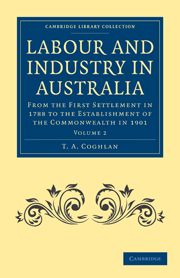 Labour and Industry in Australia
Labour and Industry in Australia The immediate effect of the gold discoveries on all industries other than mining was harmful. Large numbers of men threw up their ordinary employments and went to the goldfields, most of the others stood ready to leave their work without warning; in many places stations were deserted, farms left uncared for, and factories brought to a standstill. This was the condition during the latter half of 1851 and the greater part of 1852. Towards the close of the last-mentioned year there was a considerable recovery, and thenceforward, to the end of the period, there was a marked advance in the industrial development of every colony.
AGRICULTURAL AND PASTORAL PURSUITS
In New South Wales during 1850 the breadth of tillage was little short of 200,000 acres, which was a more considerable area than had previously been cultivated. In 1852 the area under crop fell back to about 130,000 acres, and great difficulty was experienced in gathering the crops even from this reduced area. The farmers suffered a further drawback as, owing to the demands of the mining population, vehicles of all descriptions were taken away from their ordinary use and employed in carrying stores, timber, machinery, and other material to the goldfields, and in all cases it was difficult, in some well-nigh impossible, for farmers to obtain carriage for their produce to market.
To save this book to your Kindle, first ensure no-reply@cambridge.org is added to your Approved Personal Document E-mail List under your Personal Document Settings on the Manage Your Content and Devices page of your Amazon account. Then enter the ‘name’ part of your Kindle email address below. Find out more about saving to your Kindle.
Note you can select to save to either the @free.kindle.com or @kindle.com variations. ‘@free.kindle.com’ emails are free but can only be saved to your device when it is connected to wi-fi. ‘@kindle.com’ emails can be delivered even when you are not connected to wi-fi, but note that service fees apply.
Find out more about the Kindle Personal Document Service.
To save content items to your account, please confirm that you agree to abide by our usage policies. If this is the first time you use this feature, you will be asked to authorise Cambridge Core to connect with your account. Find out more about saving content to Dropbox.
To save content items to your account, please confirm that you agree to abide by our usage policies. If this is the first time you use this feature, you will be asked to authorise Cambridge Core to connect with your account. Find out more about saving content to Google Drive.